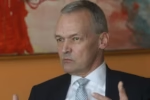Kosovo entered 2025 fully aware that parliamentary elections would take place — but without knowing what political turbulence would follow.
A deadlock in constituting the Assembly, a series of complaints to the Constitutional Court, a caretaker government with limited powers, and the risk of losing hundreds of millions of euros in foreign funds have already placed the state under strain.
Now, another challenge has emerged: the 2026 state budget, projected by the Ministry of Finance to total around €3.5 billion.
Former Minister of Economy Haki Shatri describes the current situation as “deeply concerning.”
“The budget is the material foundation of the state. If that foundation collapses, the state collapses — it simply cannot function,” he told Radio Free Europe.
The Budget Approval Process
The annual budget is drafted as early as March, through a series of circulars distributed to all budget-funded institutions.
Under ideal conditions, the Government completes its preparations and — according to the Law on Public Finance Management — must approve the final draft by October 30.
Parliament then has two months (November 1 to December 31) to review it in two readings, through committees, and to make necessary amendments.
But Kosovo faces two obstacles.
First, the caretaker government has limited decision-making powers.
Although the law does not explicitly mention a “caretaker government,” it defines a resigning government as one that functions after the dissolution of Parliament until a new government is formed.
While such a government cannot pass new laws, it may propose the state budget for parliamentary approval.
Second, Kosovo is awaiting a Constitutional Court ruling to determine whether the Assembly has been properly constituted — and depending on the outcome, the entire budget process could be delayed.
“If we remain without a functioning government and parliament, as of January 1, there will be no budget, and no payments can be processed without a parliamentary decision,” said Shatri.
This means that salaries, pensions, police and army fuel costs, and procurement of essential supplies would all be blocked.
“Practically speaking, it would mean locking down the state,” Shatri warned.
What Can Be Done?
Caretaker Finance Minister Hekuran Murati recently stated that the government would “do everything in the interest of the state and the republic, to ensure continuous institutional functioning, as we have done so far.”
If the new government and Assembly fail to act in time, one option remains:
The executive could propose an amendment to the current Budget Law to extend its validity beyond December 31. This would allow monthly spending based on the average of the previous year, a mechanism known as the “1/12 rule.”
Shatri recalls that Kosovo has resorted to this measure two or three times since its independence.
Will the New Budget Be Substantive?
Even if Albin Kurti or another political leader manages to form a new government and proceed with the budget, Shatri doubts it will be well-structured.
“There hasn’t been a fully empowered minister to design proper development policies for the upcoming year. Therefore, the next budget could end up being a copy of the previous one,” he said.
Economic Consequences
Lulzim Rafuna, President of the Kosovo Chamber of Commerce, said that the lack of fully functional institutions is severely damaging the economy.
“Businesses need predictability — to know fiscal policies, capital investments, and which public projects might attract private investment,” Rafuna told Radio Free Europe.
He emphasized that next year’s budget should focus on fiscal reforms, increased capital investment, and improving the country’s image to attract foreign investors.
Shatri added that Kosovo should take advantage of public loans and credit opportunities to create fiscal space for dynamic economic growth.
According to a World Bank report, economic growth in the Western Balkans is expected to decline from 3.6% in 2024 to 3% in 2025, with the sharpest drops projected in Serbia and Kosovo — though Kosovo still remains slightly above the regional average.







